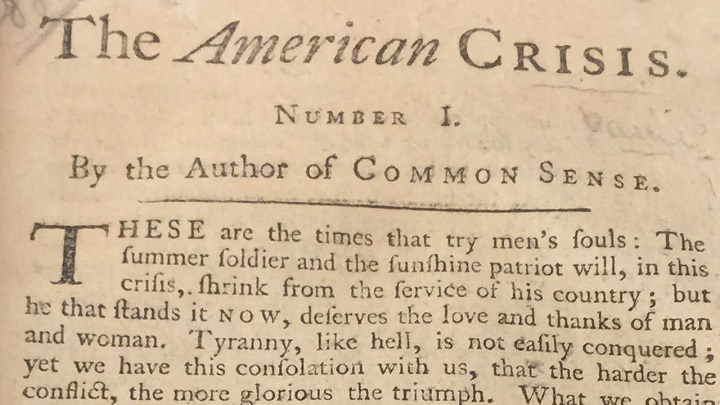
One year after what amounted to a botched attempted coup in America, the January 6, 2021 supporters perhaps should have been arrested. They haven’t been for many reasons, mainly in hopes of not deepening the great divide of American society and trying conversely to bring the political movement behind it back into the mainstream.
One year after the event that made both American and global history, one wonders if this is happening or the divide is growing bigger.
There is hardly any data; there are only impressions. Perhaps it’s better to keep an open mind.
On the anniversary, US president Joseph Biden drew a line in the sand voicing strong support for the American democratic system. He denounced his predecessor Donald Trump for spreading lies and undermining the system thus creating an opportunity for authoritarian regimes like China and Russia to fight freedom and democracy everywhere. Almost as evidence of this, in the same moment of Biden’s speech the Chinese daily Global Times printed a scathing denunciation of “American style democracy” quoting just the attack on Capitol Hill last year[1].
Then, twelve months after the event, the US and the world didn’t manage to put it behind, which is still tormenting everybody.
Some in America do believe the divide is growing bigger between right and left. American society is in a deep crisis that could lead to either a civil war[2] or war against a foreign enemy. Or even both. American society has problems of political focus compared to authoritarian systems, but it has also excess energies it can squander.
An example of wasteful commitment can be found in the history of England some 170 years ago.
In the 1850s and 1860s, England fought the Sepoy rebels in India and in the Second Opium War in China, siding against the Taiping in favor of the emperor (just like the Manchu did two centuries earlier). It battled against Russia in Crimea, and sided with the Confederates against the Union in the American civil war. America was the only fight it lost. And it counted, because from then on the US was on the rise and England’s fortunes started waning.
Is America going to return to a civil war? Is there an external power inciting it? Is America going to externalize its tensions and start a war abroad? And what will the global consequences be of it all?
In the 1930s, with the Great Depression, the country was torn, bitterly divided between literally starving people and those who racked up all the wealth. In this situation, World War II was transformational, and it created the basis of the society that still lasts today. Then, from a rational point of view, chances should be that, rather than being consumed in a bitter civil war, hot or cold, America could choose or be prompted to eternalize its domestic tensions.
This is what Japan did with World War II. Yes, America was supporting Chinese troops against a Japanese invasion, and yes, it was cutting access to Indonesia oil, thus making Tokyo’s victory very difficult and perhaps impossible. But it was Tokyo that chose to attack Pearl Harbor. It was Germany and Italy that declared war on America, not the other way around. Now, when the formal declaration of wars is gone and conflicts in space and cyberspace may be already afoot, slipping into something more tangible could be easier.
New difficult space for thinking
This creates a complex space of thinking for China. China on the surface should root for the breakup of America, thinking it would emerge the winner. But that would be like playing chess only one or two moves deep. In fact, if the US is in a crisis and its civil war would be an international affair, it would be impossible for China not to be dragged in and eventually suffer from it. China could be hurt by it in many ways.
Perhaps what is most important is that China should understand what is happening in the US. The US is changing in nature. When it wrested them from Spain, the US didn’t make Cuba or the Philippines states, as it did with Texas or California, won from Mexico[3]. Texas and California were sparsely populated and local Mexicans could easily be absorbed by more American immigration from the east. The same could not happen with properly settled Cuba or the Philippines. If they were absorbed into the union and made into new states, the US would lose its cultural WASP (White Anglo-Saxon Protestant) DNA. That is, to avoid changing the WASP DNA, America gave up on proper territorial expansion.
Now, this DNA change is happening anyway. Catholics, for instance, are split, half with the old school WASPs, half with the new identity. So are Jews, originally not WASPs but then integrated into mainstream society. Therefore, they are crucial as they can bridge a new union.
Will the split devolve into an actual fight? Nobody really knows, but it’s doubtful. The army kept aloof a year ago and sided against a coup.
Either side may make some kind of different coup, playing with old features of Anglo-Saxon democracy: gerrymandering and voter suppression. That is, because voting is important and countable, the ruling elite has tried for centuries to manipulate the process trying to balance popular access to the hard fact that not all votes are equal in reality. Some people count more and some less than others and this can’t be ignored in the actual count of the ballots. If this is disregarded the system will lose its balance. Yet the balance is always changing, as influence out of the ballot box is unstable. New gerrymandering could happen again, it could be very controversial and it will have to find a new consensus, national and international, because of the global role of the US.
But when actual wars are mostly not fought in the trenches, it is hard to think that fights in the US will spill into pitched battles. In 1861, at the onset of the Civil War, it was radically different because millions of people’s lives, those of the slaves, were at stake against the big and small fortunes vested in those lives, the slave owners. Lives would be lost either way. Either the slaves would forfeit their freedom, or the slave owners would lose all of their money, invested in the actual property of the slaves and production through slavery[4].
Still, perhaps the greatest gerrymandering and voter suppression is not in the United States but outside of it. What to make of the world that spins around America but is not made of American citizens? For instance, we Italians are non-Americans but undoubtedly part of the American empire, and have no voting rights.
President Trump was divisive in America and between America and its empire. Suppose America loses its empire, hidden or not. In that case, it loses itself, and that would be not only an American suicide; it would mean ending the world in all its present states, and only madmen could hope to survive in the ensuing chaos.
The Roman empire faced similar quandaries. Citizenship, and thus rights to vote and be voted for, was first restricted to actual Romans, then extended to people from the Italian peninsula, and then with Caracalla to the whole empire.
There are many conundrums here: People of the American empire can speak and often speak about American policies and get an audience and hearing, but only indirectly. Is it feasible to carry on like this for long? With freedom of speech but no rights of political participation, can this two-tier system last much longer without creating fragile systemic unbalances?
Now, who has voting rights for our “imperial” president: the senate of “Roman” Washington or the people of the empire?
How to rule the world?
Here global contention about China is about freedom, the management of its democracy, and its res publica. The US may suppress votes in its “Senate,” but China has no open ballot, and nobody has the right to say anything on Chinese policies if not officially sanctioned.
If China wants to be better than the US at the present American imperial job, it should be more democratic, freer than the US, and have less, not more, voter suppression. Then everybody will cheer the new Chinese empire, just as they did when Americans replaced the English.
If China doesn’t, the chances are that with or without a coup in America, the world that counts will gang up against China.
It is not simply a choice of the lesser evil. Despite all its confusion and mistakes, the US is coming out on top of Covid. It has the most effective vaccines, while others are failing. Its economy is bouncing back, although inflation is kicking in and hitting the poor. But inflation decreases American debt and brings grievances to China and Russia, whose poor and middle class may suffer more from price hikes. China, conversely is now in a vise. The perseverance of Covid and its new aggressive variants make its policy of zero infection increasingly impossible and untenable because the disease will last many years.
Moreover, its vaccines have proved less effective than the American ones. Beijing will have to close itself down—and even that will not guarantee anything, as the recent lockdown of the entire city of Xi’an proved—or it will have to change radically. It will have to accept coexisting with the disease and use better vaccines.
But here, there are prices to pay. China’s health care system is weaker than the American or European systems. Can it sustain a greater spread of infection? Politically, can the party turn around and admit a political mistake in handling Covid? These questions do not have black-and-white answers but need a lot of soul-searching.
So, it’s not all bad in America. That is, the US works despite its poor leaders, and the state is more solid. Are Chinese President Xi Jinping or Russian President Vladimir Putin better leaders than US presidents Donald Trump or Joseph Biden? Possibly they are, but they sit in states that have been worse off during Covid, the biggest stress test of all. In the end the resilience of the state not the wisdom of the leader prevails, as also Chinese classics maintained over 2,000 years ago.
[1] https://mp.weixin.qq.com/s/HrhU6z0tiQ43DW7–Q5bmw
[2] See for instance the eloquent denunciation by Stephen Marche https://www.theguardian.com/world/2022/jan/04/next-us-civil-war-already-here-we-refuse-to-see-it The Next Civil War: Dispatches from the American Future – January 4, 2022 By Stephen Marche and How Civil Wars Start: And How to Stop Them – January 11, 2022
By Barbara F. Walte and this: https://www.forbes.com/sites/joewalsh/2022/01/05/us-bought-almost-20-million-guns-last-year—second-highest-year-on-record/
[3] See Daniel Immerwahr’s How to Hide an Empire (MacMillan, 2019)
[4] See Bhu Srinivasan, Americana, Penguin 2017, chapter four “Cotton”; and Sven Beckert Empire of Cotton, Vintage Book, 2014






In addition the US economy is unable to pay for itself and can only be kept afloat by the creation of trillions of dollars out of thin air. That has been acceptable because those dollars are needed to finance international trade and as monetary reserves as was shown by the 1998 dollar crisis that let to huge losses for poorer countries, except Malaysia, and correspoding profits to US entities. However as David Goldman explained some months ago with the introduction of 5G the amount of money necessary to finance trade vwill be much less when using electronic RMB and thus much cheaper which will make those huge dollar reserves unnecessary.
To conclude most countries will be very happy to be rid of world hegemons and will welcome China as protector from that pernicious institution.
Not very long ago US companies were often superior to those of other countries and US was able to profitably operate in many countries financed by US banks and protected by US Navy. In Latin America US installed friendly covernment, not always dictatorships, to make sure its companies and banks were paid. After the Second World War it also won access to the former European colonies and was further supported by IMF and World Bank. Africa especially suffered terribly under this regime as the former colonial powers didn’t oppose US practice.
But now China is providing the technical and economic support the African countries need, developing ports and railways, investing in production and distribtion of electric power and in other sectors of their economy. A few weeks ago I read that US plans to invest more in its Africa Command to oppose China’s economic penetration. The writer might have been thinking of the example considered in this article by Ambassador M K Bhadrakumar: https://www.indianpunchline.com/neocolonialism-haunts-horn-of-africa.
In 2011 US was able to destroy Chinese investments in Libya with a value of eleven billion dollars when with its satellites it destroyed that country.
In 1948 it set up NATO as a defensive organisation and in which it welcomed the Portuguese fascist dictator Salazar. NATO has until some months ago been defending itself in Afghanistan for nearly twenty years and has now been invited to extend its reach to the Indo-Pacific area no doubt to help defend the US satellite Taiwan.
Compare the capabilities of China and US as shown in this article in Asia Times by Scott Foster: https://asiatimes.com/2022/01/belt-road-encircles-latin-america-and-the-caribbean/
The US needs acceptance of the “International Liberal Rules Based Order” in which it is free to change the rules as required and to spend a third of the World’s military spending to try to maintain its hegemony while China its trying to achieve and then maintain its superiority by developing a superior education for its people and a comprehensive economy. For China the Charter of the Uited Nations will surfice and fighting other countries as US has done nearly every year of its existance will not be necessary. Indeed to China the armed forces necessary for such an attitude look like waste.
best joke piece e ever
Have you ever thought that China doesn’t want an empire? At least not a hegemonic empire that US and the West have constantly tried to achieve? Have you ever thought that China simply wants to do what it’s been doing, and pretty much left alone, and not be part of anyone else’s empire? The US is no different than the Qin. Countries rise up because the rule is unjust.
Sicci still doesn’t understand the difference between wangdao, the kingly way and badao, hegemonic way. China learned the difference long time ago during the Warring States period. When will the US, the West, and Sicci learn the difference. You would have thought Sicci would have learned these concepts long time ago when he was studying Sinic philosophy.
Well perhaps you… the last “critic” could spell his name correctly